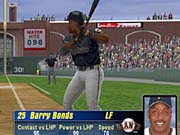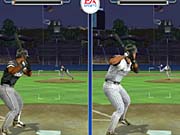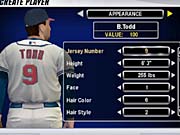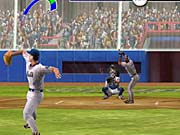Serious baseball fans crave realistic ball games and player stats, which is why most serious baseball fans haven't much cared for arcade-style games like EA Sports' Triple Play series. So when EA announced that it was replacing Triple Play with MVP Baseball 2003 this year, not many baseball fans were very disappointed. And as it turns out, the new game gets more things right than the entire Triple Play series did in nearly a decade. While MVP Baseball 2003 isn't perfect, it's still an impressive first entry in a new sports series and a very good baseball game in its own right.

MVP Baseball 2003's most distinctive feature is its interface, which is considerably different from the interface used by most other baseball games in that it offers players more direct control. This is most notable when you're on the mound, as the stereotypical selection of pitch types and pitch location has been replaced with a meter similar to the one used in golf games. After picking a spot, you hold a button for the desired pitch type to get the meter started clocking the velocity. When you have enough power behind the throw, you release the button and then press it again to determine your release point. If your timing is good, you'll be able to paint corners. Misfire and you'll reveal the kind of pitch you're throwing or simply float one over the plate.
You'll have to do pretty much the same thing when fielding, or you'll risk wild tosses that result in errors. This system works very well and keeps you involved in the game while pitching, which is definitely a plus if you're the sort of baseball fan who prefers action-packed games and can't wait to get up at bat again. Hitting is also more involved than in the Triple Play games. You just have to press a single button to swing, but you actually have to aim--and for this, you'll be best served by a good gamepad. To hit a fly or go for the fences, you need to push up in combination with pressing the swing button. Pushing down results in a grounder, and pushing to either side will allow you to pull the ball or go to the opposite field.

But these game mechanics aren't without a few problems. For starters, you can't turn off the pitch meter and go with a more conservative control system. Anyone who wants to break things down to the basics of throwing and swinging will have to look elsewhere. The controls are also overly finicky on both sides of the ball. Pitching is so difficult that it's tough to record strikeouts, at least at first. Computer batters are incredibly patient at all difficulty levels and swing only at good pitches. With practice, you'll start striking out your batters, though you really have to finesse your way to domination on the mound by varying pitch types, locations, and speeds. This may be a good feature in the long run--especially if you love a challenge and have the patience to play through 20 or more lopsided losses--but the learning curve seems awfully steep for an arcade-style sports game. Fielding can be flat-out annoying. Using a meter to govern throws in the field seems a bit excessive--even routine tosses to first and getting the ball in to second from center field can be inordinately complicated. Hitting is also harder than it usually is in these sorts of games. Timing is vital, even at the easier difficulty levels. The ball seems to have a lifelike snap, making it tough to get around on pitches before they reach the safety of the catcher's mitt. All in all, expect to play a lot before you get comfortable.
Outside of the control system, MVP Baseball 2003 is a fairly run-of-the-mill arcade-style baseball game. In solo play, you can stage exhibitions, set up a tournament, enter the home-run showdown, or get into a franchise mode that has a fair amount of depth for this sort of title. You won't confuse the game for a management simulation, but the game does have a surprising number of management options, like player contracts, team budgets, a robust player-creation system, and team-specific goals that you have to work toward as a manager over a 10-year term. But the game truly excels in online play. Multiplayer contests, which can be played via LAN, direct IP connection, or the EA Sports Online matching service, emphasize all the interface strengths and minimize artificial intelligence quirks like players not swinging at balls out of the strike zone. Connections are solid on a DSL line, with no slowdown or other obvious issues.

EA went all out with MVP Baseball's graphics, easily outstripping all competitors with a TV-broadcast-style presentation that's accurate right down to the motion-captured animations, which perfectly capture batting stances and pitching styles. Player faces are recognizable as well, particularly cover boy Randy Johnson, who carries his beanpole frame and trademark growl from the lineup of the Arizona Diamondbacks to the game. The game's stadium art is bright and colorful, and while it's perhaps a bit cartoonlike, it's still very effective at replicating a big-league atmosphere, especially when it comes to the best and brightest parks in the Major Leagues. Play in the bayside home of the San Francisco Giants or the infamous Bronx Zoo of the New York Yankees and you'll feel like you just paid a visit to Pac Bell Park or Yankee Stadium. In a ball game, the strike zone colorfully depicts each hitter's hot zones, and picture-in-picture cameras track runners on base.

MVP Baseball's audio quality is also excellent. Play-by-play broadcaster Duane Kuiper and color man Mike Krukow of the Giants make keen observations and stay with the on-field events. They also show restraint and keep quiet for long stretches when there isn't much to say--a welcome trait for anyone who sat through the insufferable "At the Improv" act of Triple Play commentator Jim Hughson. MVP Baseball 2003 really excels at the little things where sound effects are concerned. The crowd noise consists of remarkably varied shouts, whistles, claps, heckles, and calls from eager vendors hawking their wares. Team-specific chants are whipped up in most parks, and organists will get the crowd going at tense moments or when there's a lull in the action.
But lulls in the action seem few and far between in MVP Baseball 2003. EA has created one of the most enjoyable arcade-style baseball games of the year, and even though it could use some refinement, MVP Baseball 2003 is a great first step that bodes well for the future of the new series.